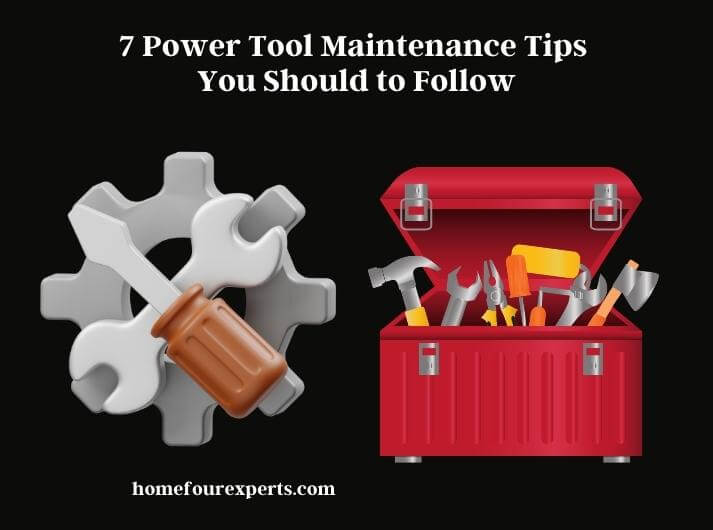Naturally, we all love the time-saving advantage of power tools. They assist us in tackling any large or small projects. For getting a longer advantage of your tools, you have to follow a few power tools maintenance tips. Just take a little care, it will go a long way in your tools’ life and functionality. Keeping your power tools in a better operating situation is key to your team’s productivity.

Properly managing your power tools maintenance system ensures you will get out of your tools and avoid hasty replacement costs. Preventative equipment is key to extending tools’ life and saving you lots of time and money.
All know an old saying among craftsmen “A poor workman holds his tools responsible every time.” If you don’t take proper care of your power tools that come true, that will be an old saying. That also means they will use it safely. Here, we share a few things you can do to prolong your power tools life. So, being with us and getting the importance of maintaining the power tools.
The Importance of Properly Maintaining Your Tools
We all know that quality tools can be an effective investment. They will last longer if you take good care of them. Make sure about your devices are
- Properly stored; and
- Fully cleaned up.
If you are well-maintained, then you can save time and money. Also, making your projects more comfortable. When it comes to storing your tools, you can store them in a toolbox, bags, and chest. Also, you keep them in drawers. Pegboards are a great storage system for tools.
Toolboxes have the great benefit of portability. It is also easy to transport. If you don’t store them in a safe space, the rust will easily come to your tools. Cleaning your tools after use every time. It is essential. Because if they are dirty, they will be easily attacked with rust. We hope these tips will ensure your tools last longer.
What Steps Should I Take to Ensure I Properly Store My Power Tools?
To properly store power tools, you should:
- Clean them thoroughly before storing them, removing any debris or dust to prevent rust or corrosion.
- Store them in a dry, cool place, ideally in a tool chest or cabinet.
- Use protective covers or bags for power tools that are not being used for an extended period of time.
- Keep power tools organized and in a designated place, so you know where to find them and can easily access them when needed.
- Make sure to unplug power tools before storing them.
- Keep corded power tools stored away from water and other liquids that may damage the electrical components.
- Keep tools away from children and out of reach of people who do not know how to use them safely.
How Can You Maintain the Power Tool?
Do you know that power tools would be quite an investment? If you want to make good use of your money. You can maintain your power tools in a small task and not necessarily be technical. Below we share 7 simple tips on how to take care of your power tools correctly.
1. Lets Cooling Down Your Tools
Do you know quality power tools are more tough and more durable machines made from some tough materials? Most of tools have a breaking point, and it’s essential to recognize when you’re pushing a tool to its natural limit.
If you’re working on a tough task like drilling and the tool has overheated, you have to give it a break. Normally letting a motor cool down can go a long way toward ensuring that your tools last.
2. Always Keep Your Tools Clean
Try to keep your power tools clean up, and ensure the tools have a longer life. After using it every time make sure to clean the dust, and dirt off your power tools. You can clean up your tools with a cloth or a toothbrush. A flexible pipe cleaner is used to remove larger chips that will free from the other delicate areas.
3. Properly Storage Power Tools
The most important thing is that your power tools need to be stored in a clean and dry place. Suppose, your stored space is in a moist environment then it will create problems with the electrical components and also cause corrosion.
This causes safety issues that may be stopping your tool from working completely. Tools also should be stored inside a case or cabinet when not in use. This helps remove excess dust from getting into the tools through the vents when not in use.
4. Power Tools Lubrication
The power tools need proper lubrication for their function. Using the perfect or right lubricant for your tools is important. Generally, you will find the different lubricants have several grades and viscosity, and frequency of reapplication.
5. Keep Sharpening Blades
The sharpened tips of your saw and drill blades get worn down and dulled. You have to force your tool, and work will be harder if you use a dull blade in a tool. Regularly sharpening power tool blades makes it easier for their power tools to work, putting less stress. That’s for the tool’s motor to extend its life.
6. Tool Batteries Maintenance
Truly the batteries for your power tools are more expensive. So, you should have good maintenance of it. That’s because your batteries are long-lasting. And operate your tools at their highest levels.
Batteries should store in air-controlled environments where the temperature remains consistent. Do you know heat kills battery performance? Please don’t leave them in the sunlight. Try always to keep them cool down after use and charging.
7. Replace Worn Parts
As like every tool, after use, some parts will generally need to be replaced. Carbon brushes are one of the common replacement parts of tools. That is responsible for producing electricity through the motor. Another two parts will also be a replacement. They are power cords and switch assemblies. Because of overtime use, it will be damaged and need replacement.
What Are Some of the Most Important Power Tool Safety Tips?
Some of the most important power tool safety tips include:
Always wear safety glasses when using power tools.
Always use proper hand protection, including gloves and a face shield, when using power tools.
Do not use power tools while intoxicated.
Ensure that the power tool is properly plugged into an outlet and into a properly grounded electrical outlet.
Keep the work area clean and well-lit. Follow the manufacturer’s instructions for using the power tool.
What Are Some of the Most Common Mistakes People Make?
Some common mistakes people make when it comes to power tool maintenance include:
- Not cleaning the tool after each use: Dust and debris can accumulate on the tool, causing it to wear down more quickly and potentially malfunction.
- Not lubricating moving parts: Power tools have many moving parts that need to be lubricated to prevent friction and wear.
- Not changing the air filter: Air filters on pneumatic tools should be changed regularly to ensure the tool is running efficiently.
- Not storing the tool properly: Power tools should be stored in a dry, cool place to prevent rust and damage.
- Not following the manufacturer’s instructions for maintenance: Each tool has specific instructions for maintenance and it’s important to follow them to ensure the tool functions properly and lasts as long as possible.
- Using a tool for the wrong application: Using a power tool for an application it is not designed for can cause damage to the tool and also to the operator.
- Not inspecting the tool before use: Checking for any visible damage or wear before using a power tool can help prevent accidents and prolong the life of the tool.
What Safety Precautions Should I Take When Using My Power Tools?
When using power tools, it is important to take the following safety precautions:
- Always read and understand the manufacturer’s instructions before using the tool.
- Wear appropriate personal protective equipment, such as eye and ear protection, and a dust mask if necessary.
- Keep the work area clean and well-lit.
- Keep the floor in the work area dry and free of debris.
- Keep all guards and safety devices in place and working properly.
- Use the correct tool for the job.
- Unplug the tool when not in use.
- Disconnect the tool from the power source before making adjustments or changing accessories.
- Do not use damaged or worn out tools.
- Use caution when working with power tools near flammable materials.
It is also important to be aware of your surroundings and to avoid distractions while using power tools.
Power Tools Reduce Your Safety Risks?
In general, keep your power tools operating more efficiently and productively. All your tools need proper care. If you want your power tool to work well and safely, then you should check often. Also, repairs that parts may need for getting a safe operation. Don’t use your power tool in the wet.
- Defend your joints and your overall health.
- Lessen your construction risk.
- An environment-friendly feature.
Conclusion
Malfunctioning of safety machines such as red buttons known as emergency buttons, protective covers and guards, etc. Broken grinding wheels and dull blades would be reasons for injuries. So, you should safely operate.
If you follow those power tools maintenance tips, we hope you will get your tools a longer life. Because taking poorly maintained tools would cause significant noise and vibration. Proper care means don’t think about cleaning up and storing.
And also, damaged anti-vibration mountings in a power tool can raise vibration transmission to the worker. Thanks for being with us, and please comment below on your experience.
Read more:
About This Writer

Hi, I am Eric Devin and I am a professional interior architect. Since childhood, I've always enjoyed DIY projects! And, I have loved to solve simple household problems using essential tools and equipment. I have also acquired a lot of information about basic household tools settings by working with contractors.